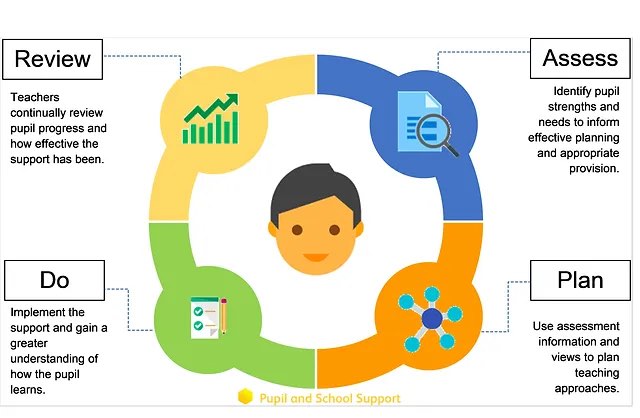SENCo's Role
What's involved in a SENCo's Role and how do they support pupil progress?
Main, P (2021, December 09). SENCo's Role. Retrieved from https://www.structural-learning.com/post/sencos-role
What's involved in a SENCo's Role and how do they support pupil progress?
Main, P (2021, December 09). SENCo's Role. Retrieved from https://www.structural-learning.com/post/sencos-role
SENCoS or sometimes SENDCos (Special Educational Needs Co-Ordinators) are the instructors working to coordinate the provision for pupils with disabilities or special educational needs (SEN) in schools. While working in collaboration with other senior leadership team and the headteacher, SENCoS will use their leadership skills to support other teachers and manage provision for children with SEN in their schools.
SENCoS are the providers of education that create and deliver interventions for students in the classroom while implementing the school strategy. They may offer their duties within the classroom or could be working across several schools. This challenging role brings with it a lot of responsibility and job satisfaction in equal measure. From our experience of working with schools, the educational needs teacher is often the most skilled at identifying all aspects of student difficulties. They are usually the member of staff who advises fellow teachers on the instructional adjustments for pupils to access the curriculum. In this article, we will explore how this central figure in mainstream schools supports the progress of children and how you might begin thinking about taking the plunge and applying for this role in your school.
A Special Educational Needs Coordinator is mostly an experienced teacher whose key role involves supporting students with special educational needs. They may be working towards an additional teaching qualification such as a masters or be involved in a specialist course through an organisation such as NASEN. Because the demands of the role, it usually involves moving away from any class teaching commitment. To meet the needs of vulnerable pupils, advisory teachers will be expected to attend additional training as eventually they will be involved in the delivery of training to their colleagues. Below is a list of the type of roles and responsibilities a SENCo could expect to do in a typical week:

All the SENCoS play a vital role in their schools, therefore, they need to have a leading status in the school. Some schools don't give enough status to their SENCo even though according to the registered pupil population with SEN, 20% of the total children in each school are likely to have some type of special educational need.
If the leadership team of a school lacks a SENCo, it can make the role of SENCo even more difficult. With status arrives the authority and capacity to bring change whenever needed. Therefore, it is less likely for SENCos to introduce any effective change in the school if they do not have a place in the school's leadership team.
Also, not having any SENCo in the leadership team may raise questions about the school’s belief in inclusion and it may reflect the status of SEN on the school's agenda.
Also, the SENCos must have sufficient time to effectively perform their duties. Their Code of Practice must clearly state that the SENCo needs to have ‘sufficient resources and time to perform their role'. It’s difficult to be precise how much time SENCos will be needing to perform their duties as every school has a different plan.
Each school has a different number of students with SEN. A SENCo may need more time than a single day each week to carry out the responsibilities effectively. Relieving this member of staff from classroom teaching duties can provide them with the time they require to support students needs.

The code of practice has identified four major areas of need for students with SEN:
An experienced and qualified teacher will need to attend professional development and work with commitment and honesty towards their SENCo status. A SENCo works in partnership with parents, teaching assistants and others to provide the best service possible for the children. A SENCo ensures that any provision or plans agreed for the children with SEN are effectively carried out by their education settings.

The most effective teachers who work with children and parents with SEN are well-informed about the provision of the individual child. The family must attend regular review meetings where both SENCo and the family can discuss the progress of the children with SEN. The following are some of the important qualities of a SENCo:
In both primary and secondary school settings, effective SENCoS advocate for children with SEN by understanding their needs and making sure that everyone in the school setting (especially those who work with children with SEN) know the best ways to support them. A SENCo's provision cannot be as good as it should be unless the SENCo works in close contact with the headteacher, who must identify and support the critical strategic leadership role of the SENCo. The school's action plan for SEN should not be an add-on or afterthought – it must be truly connected to the whole-school priorities.

As we have seen, Special Education Needs Coordinators (SENCOs) play a vital role in schools, ensuring that children with special needs receive appropriate support. However, they face several challenges:
These challenges highlight the multifaceted role of the disabilities coordinator in schools. Addressing them requires a comprehensive understanding of special education, collaboration with various stakeholders, and a commitment to continuous improvement in inclusion in school practices.
SENCoS or sometimes SENDCos (Special Educational Needs Co-Ordinators) are the instructors working to coordinate the provision for pupils with disabilities or special educational needs (SEN) in schools. While working in collaboration with other senior leadership team and the headteacher, SENCoS will use their leadership skills to support other teachers and manage provision for children with SEN in their schools.
SENCoS are the providers of education that create and deliver interventions for students in the classroom while implementing the school strategy. They may offer their duties within the classroom or could be working across several schools. This challenging role brings with it a lot of responsibility and job satisfaction in equal measure. From our experience of working with schools, the educational needs teacher is often the most skilled at identifying all aspects of student difficulties. They are usually the member of staff who advises fellow teachers on the instructional adjustments for pupils to access the curriculum. In this article, we will explore how this central figure in mainstream schools supports the progress of children and how you might begin thinking about taking the plunge and applying for this role in your school.
A Special Educational Needs Coordinator is mostly an experienced teacher whose key role involves supporting students with special educational needs. They may be working towards an additional teaching qualification such as a masters or be involved in a specialist course through an organisation such as NASEN. Because the demands of the role, it usually involves moving away from any class teaching commitment. To meet the needs of vulnerable pupils, advisory teachers will be expected to attend additional training as eventually they will be involved in the delivery of training to their colleagues. Below is a list of the type of roles and responsibilities a SENCo could expect to do in a typical week:

All the SENCoS play a vital role in their schools, therefore, they need to have a leading status in the school. Some schools don't give enough status to their SENCo even though according to the registered pupil population with SEN, 20% of the total children in each school are likely to have some type of special educational need.
If the leadership team of a school lacks a SENCo, it can make the role of SENCo even more difficult. With status arrives the authority and capacity to bring change whenever needed. Therefore, it is less likely for SENCos to introduce any effective change in the school if they do not have a place in the school's leadership team.
Also, not having any SENCo in the leadership team may raise questions about the school’s belief in inclusion and it may reflect the status of SEN on the school's agenda.
Also, the SENCos must have sufficient time to effectively perform their duties. Their Code of Practice must clearly state that the SENCo needs to have ‘sufficient resources and time to perform their role'. It’s difficult to be precise how much time SENCos will be needing to perform their duties as every school has a different plan.
Each school has a different number of students with SEN. A SENCo may need more time than a single day each week to carry out the responsibilities effectively. Relieving this member of staff from classroom teaching duties can provide them with the time they require to support students needs.

The code of practice has identified four major areas of need for students with SEN:
An experienced and qualified teacher will need to attend professional development and work with commitment and honesty towards their SENCo status. A SENCo works in partnership with parents, teaching assistants and others to provide the best service possible for the children. A SENCo ensures that any provision or plans agreed for the children with SEN are effectively carried out by their education settings.

The most effective teachers who work with children and parents with SEN are well-informed about the provision of the individual child. The family must attend regular review meetings where both SENCo and the family can discuss the progress of the children with SEN. The following are some of the important qualities of a SENCo:
In both primary and secondary school settings, effective SENCoS advocate for children with SEN by understanding their needs and making sure that everyone in the school setting (especially those who work with children with SEN) know the best ways to support them. A SENCo's provision cannot be as good as it should be unless the SENCo works in close contact with the headteacher, who must identify and support the critical strategic leadership role of the SENCo. The school's action plan for SEN should not be an add-on or afterthought – it must be truly connected to the whole-school priorities.

As we have seen, Special Education Needs Coordinators (SENCOs) play a vital role in schools, ensuring that children with special needs receive appropriate support. However, they face several challenges:
These challenges highlight the multifaceted role of the disabilities coordinator in schools. Addressing them requires a comprehensive understanding of special education, collaboration with various stakeholders, and a commitment to continuous improvement in inclusion in school practices.